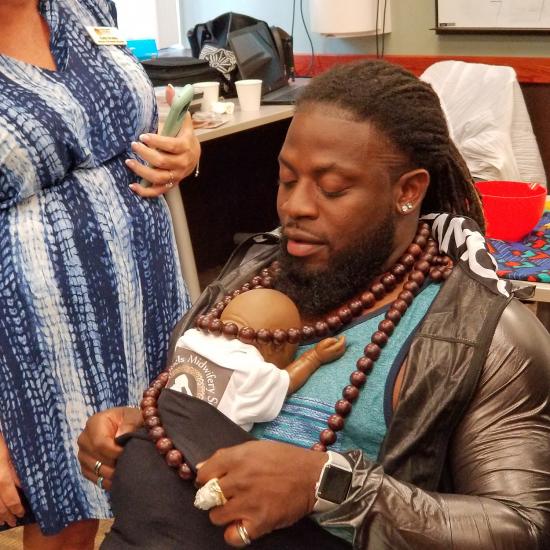With African American Babies Coalition and Projects, Support Begins Before Birth
William Moore is a health educator for Ramsey County Public Health, a semi-pro football player, an artist, and a comic book fan.
He’s also a doula.
William was one of 17 people—including one other man—who completed a five-day course to become a certified perinatal educator in June 2018. The course, which was sponsored by the African American Babies Coalition and Projects, taught William how to support and advocate for pregnant women and families before, during and after birth.
William was drawn to the doula training through his role as a liaison to Club Dad, a monthly gathering for African-American fathers in Ramsey County. While most of the participants in the perinatal educator training were women, William joined to help fathers learn to support mothers, particularly because of disparities in pregnancy and birth outcomes among African Americans nationally and in Minnesota.
Perinatal education and advocacy doesn’t need to be only for mothers, William says. “It’s family work and it’s community work.”
Creating a More Positive Experience for Families
The perinatal educator training was offered by Akhmiri Sekhr-Ra of the Cultural Wellness Center. Akhmiri sees a great need for doulas and perinatal educators because expecting parents often live away from family members who would typically serve as a support system. She says having someone who can provide information in a culturally relevant way can make a difference during pregnancy and childbirth. “I want families to have a more positive experience and a greater ability to meet the challenges they might face,” she says.
During the training, William and other participants learned about options during childbirth. He learned about mental and chemical changes that both men and women experience before and after pregnancy. He also learned that medical professionals may not understand challenges that African American mothers experience during and after birth. Because of systemic and structural racism, African American mothers carry more stress on a daily basis, William says. This stress can affect mothers’ health and the health of the babies. In addition, some doctors and nurses do not recognize that for African Americans, breastfeeding can carry shame or a stigma. Even if African American mothers aren’t treated with negativity, “they may be treated with a one-size-fits-all attitude, which simply doesn’t work,” he says.
The men who become doulas will use the training to help fathers advocate for and support mothers. “Once we’re able to do that, we are strengthening our households and our communities from within,” he says.
